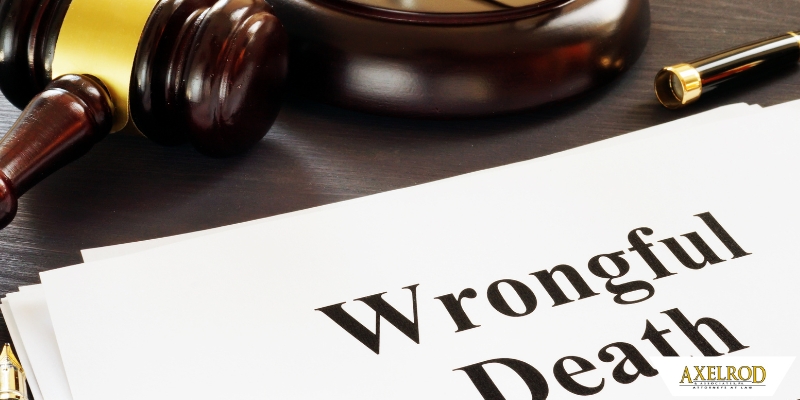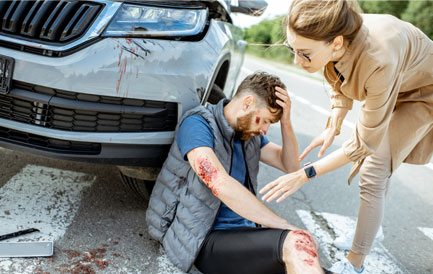4701 Oleander Drive, Suite A
Myrtle Beach, SC 29577
4701 Oleander Drive, Suite A
Myrtle Beach, SC 29577
Myrtle Beach Wrongful Death Lawyer
Wrongful Death Attorneys in Myrtle Beach, SC
Losing a loved one is unspeakably difficult. When the loss is sudden and unexpected, the pain is often compounded, and the healing process is long and arduous. When the loss was caused by someone else’s poor judgment, negligence, or malice, the pain is indescribable. Fortunately, if this is the case for your family, you have legal options.
If your loved one has been killed because of someone else’s negligence or intentional act, the Myrtle Beach wrongful death attorneys at Axelrod & Associates are here to help you recover the maximum compensation you are entitled to under SC law.
Wrongful death and survival actions may be the most important and emotionally difficult cases our attorneys file for our clients.
Your family is suffering from an unspeakable loss caused by someone’s negligence, gross negligence, or even an intentional act that resulted in your loved one’s death. What do you do now?

How do you move forward?
In the chaos after the loss of a family member, one more thing that must be done is to get compensation for your family’s loss – when your loved one’s death was caused by another person’s negligent or intentional actions, you may be entitled to substantial compensation for your economic and emotional losses and, in some cases, punitive damages.
Wrongful Death And Survival Attorneys in Myrtle Beach, SC
Wrongful death lawyers usually file the wrongful death and survival actions together. They are sometimes confused with one another, and there is some overlap, but each type of claim allows the surviving family and heirs to recover damages for the loss of their loved one.
The wrongful death action is based on the damages suffered by the deceased person’s family or heirs, while the survival action is usually based on the pain and suffering of the deceased person before their death.
Wrongful Death Actions
SC Code Section 15-51-10 authorizes a civil action for a wrongful act that causes death:
Whenever the death of a person shall be caused by the wrongful act, neglect or default of another and the act, neglect or default is such as would, if death had not ensued, have entitled the party injured to maintain an action and recover damages in respect thereof, the person who would have been liable, if death had not ensued, shall be liable to an action for damages, notwithstanding the death of the person injured, although the death shall have been caused under such circumstances as make the killing in law a felony. In the event of the death of the wrongdoer, such cause of action shall survive against his personal representative.
The beneficiaries of a wrongful death action are 1) the spouse and children of the deceased person, 2) if there is no spouse or children, the parents of the deceased person, or 3) if there are no parents, the heirs of the deceased person.
In Singletary v. Shuler, decided June 2, 2021, the SC Court of Appeals stated that the personal representative of a person’s estate can file a wrongful death action “when a person’s wrongful or negligent act causes the death of a decedent and the wrongful or negligent act, had it not caused death, would have entitled the injured party to maintain an action to recover damages.”
In most cases, it is a negligence action – we must prove that the defendant 1) owed a duty of care, 2) breached that duty, and 3) that breach was the proximate cause of the plaintiff’s damages.
The types of damages that can be recovered are not based on “the value of the human life lost,” but they are based on the “damages suffered by the beneficiaries from the death.” These damages include:
- Financial loss, including future wages and other benefits lost, funeral expenses, medical bills, and any other financial losses that can be proven
- Mental shock and anguish
- Wounded feelings
- Loss of companionship
- “Deprivation of the use and comfort of the decedent’s society.”
In cases where the plaintiff is the surviving spouse of the deceased person, financial losses can be presumed from the person’s death.
Survival Actions
SC Code Section 15-5-90 authorizes a related cause of action that is often called a “survival action:”
Causes of action for and in respect to any and all injuries and trespasses to and upon real estate and any and all injuries to the person or to personal property shall survive both to and against the personal or real representative, as the case may be, of a deceased person and the legal representative of an insolvent person or a defunct or insolvent corporation, any law or rule to the contrary notwithstanding.
In Singletary v. Shuler, the Court of Appeals also addressed survival actions, finding that the personal representative of an estate can recover for the deceased person’s “conscious pain and suffering” when there is sufficient proof that the deceased person was 1) conscious and 2) simultaneously suffering before their death.
Types of Wrongful Death and Survival Actions
A wrongful death and survival action can be brought any time a person’s death is caused by another person’s negligence or intentional act and includes most types of personal injury claims where death resulted.
Wrongful Death Caused by an Auto Accident
When an automobile accident results in death, your wrongful death attorney can file a survival action and wrongful death claim against the at-fault driver and recover 1) any damages the deceased person would have been entitled to if they had survived and 2) any damages suffered by the deceased person’s family (see above).
Wrongful Death Caused by a Motorcycle Crash
Unfortunately, motorcyclists are at greater risk of death or serious injury from reckless drivers. The fact that someone was riding a motorcycle is not comparative negligence and is not something a jury is allowed to consider in mitigation – just as with an auto accident, the personal representative of a motorcycle accident victim’s estate can file a wrongful death and survival action against the at-fault driver.
Wrongful Death Caused by a Drunk Driver
When a drunk driver kills someone, it is even more important to aggressively pursue a wrongful death and survivor claim against them, to both 1) compensate your family for the terrible losses you have suffered, and 2) hold the drunk driver accountable.
A lawsuit filed by your SC wrongful death lawyer against a drunk driver is more likely to result in a punitive damages award, and there is no damages cap where a defendant was 1) convicted of a felony charge resulting from the accident or 2) driving under the influence of alcohol or drugs.
Punitive Damages
When your Myrtle Beach wrongful death attorney can prove by clear and convincing evidence (a slightly higher burden of proof than preponderance of the evidence, the standard of proof for liability) that the at-fault person or corporation’s behavior was willful, wanton, or reckless, the jury can award punitive damages against the defendant.
SC Code Section 15-32-530 limits a punitive damages award to three times the amount of compensatory damages or $500,000, whichever is greater, but the damages cap is lifted when the defendant was 1) convicted of a felony charge resulting from the accident or 2) driving under the influence of alcohol or drugs.
Why a Myrtle Beach Wrongful Death Attorney Is Necessary
Some people believe that they can fight their own wrongful death case without the help of an attorney. Unfortunately, even if the situation feels straightforward, you can easily lose a wrongful death lawsuit if you do not have the support of an experienced attorney. To avoid serious charges, the defense will likely have an attorney, and refuting their claims will be difficult if you do not have an attorney of your own. It is best for your wrongful death claim if you hire a lawyer to build and argue your case.
Suffering from grief is all-consuming. It is important for you to take time and space to properly grieve and process the death of your loved one. If you are fighting your own case, you cannot give yourself the proper space to mourn your loss. Allowing a wrongful death attorney to handle your case not only increases your chances of winning, but it also gives you the necessary emotional freedom to process your grief.
FAQs About Myrtle Beach, SC Wrongful Death Laws
How Much Is a Wrongful Death Lawsuit Worth in South Carolina?
The value of your South Carolina wrongful death case will depend upon your unique circumstances. Some wrongful death cases are worth millions of dollars, while others settle for much less. Ultimately, the amount depends upon the severity of the injury, any medical bills accrued before passing away, the level of negligence or malice, and the impact of the death on the family and community.
When Should I Hire a Myrtle Beach Wrongful Death Lawyer?
If you believe that someone else was responsible for your loved one’s death, contact an attorney right away. You can lose evidence if you wait too long. It is best to discuss the situation with an attorney if you are unsure about whether you have a case or not.
Technically, you have three years after the date of your loved one’s death to file a claim. However, it will be difficult to prove it if you wait this long.
Who Gets the Money in a Wrongful Death Lawsuit in SC?
The immediate family usually gets the money in a wrongful death case, particularly the spouse. However, this may depend upon the deceased’s family structure and the case itself. It is important to note that this money moves intestate, meaning that it never becomes part of the deceased’s estate. This means that creditors cannot collect a wrongful death settlement as payment for the deceased’s debts.
What Is the Statute of Limitations in South Carolina for Wrongful Death?
Three years. However, it is beneficial to file the claim long before the statute of limitations has elapsed. The more time goes by, the greater the likelihood that evidence will be erased or destroyed. This can significantly harm your likelihood of winning a settlement and achieving justice for your loved one.
GOT AXELROD?
If your family member has been killed because of someone’s negligence or intentional act, the wrongful death attorneys at Axelrod & Associates will investigate your wrongful death claim, file a wrongful death and survival claim on your behalf, aggressively pursue full and fair compensation for your family, and fight to hold the guilty party accountable for their actions.
Call Axelrod &; Associates now at 843-916-9300 or fill out our contact form today to schedule a free consultation to find out how we can help.
Need help? Contact Axelrod & Associates, P.A.

Request your
Consultation
The fields marked with * are mandatory.






